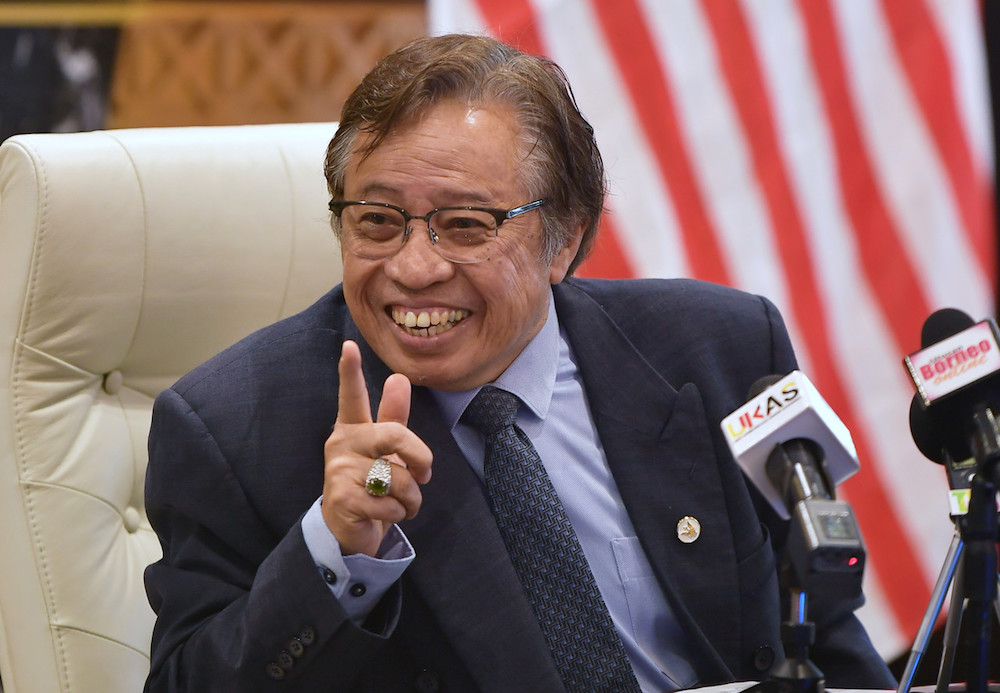KUCHING, Aug 14 ― Sarawak will install 5G infrastructure within the next 10 years starting in the urban areas, said Chief Minister Datuk Patinggi Abang Johari Tun Openg.
Speaking at the launch of Malaysia’s first 5G Test Bed sited at the Centre of Technical Excellence Sarawak (Centexs), he said it might seem ambitious of him to embark on such “cyber connectivity” but one which he felt needed to be done as the chief minister for Sarawak to be the “most forefront state in the whole of Malaysia”.
He also acknowledged others would question why Sarawak was embarking on 5G technology when some parts of the state had yet to be covered by 3G and 4G mobile connectivity.
“People will say this Abang Jo is too ambitious. But the problem is if you don’t follow the development and trend throughout the world, we will be far behind. We got no option but to prepare Sarawak and its citizens with the knowledge of that technology,” he said in his speech.
According to Abang Johari, Sarawak needed to start somewhere in this aspect in line with the state’s economic development direction for economic sectors to be driven by technology and sustainability of environment by the year 2030.
“At the moment, Sarawak government is implementing road connectivity. The next one will be cyber connectivity including 5G. We want to expand that connectivity throughout Sarawak. Of course, it’s a lot of money (involved).
“I have negotiated with the federal government, because they collect the levy under MCMC (Malaysian Communication and Multimedia Communication). They must share the levy with us in Sarawak on top of our own budget.
“We will install 5G infrastructure especially in urban areas for a start, and after that we will connect to the other parts through our road infrastructure. Meaning, we will lay down the cable alongside with our road.
“It may take five to 10 years to build that. By the year 2030, we will have that infrastructure,” he said.
He added that the next important step was to prepare Sarawakians to handle the 5G devices, which was why Centexs has several training programmes and labs in collaboration with Huawei.
He pointed out that the technology and devices which come with 5G technology would enable Sarawakians to do amongst others, data analytics particularly on the many natural resources in the state.
“Sarawak is blessed with resources. (But) we don’t know is the composition of our resources which can only be analysed through AI (artificial intelligence). As a result of this, we must train our Sarawakians to handle these new devices for our future.
“Talking about 5G, we have to start somewhere. It takes time. I must tell you, it is not immediate. But in the next 10 years, we hope to have the basic infrastructure already for 5G. Could be less than 10 years depending on how much money that we have.
“Thanks God, we could now tax Petronas. We try to get that money to improve our basic infrastructure,” he said.
According to him again, Sarawak also offers power with reasonable tariffs and renewable energy which will enable the state to be a digital hub.
“Well, if people say I am ambitious, what to do? That is the way I do my job as your Chief Minister because I want Sarawak to be the forefront state in the whole of Malaysia.”
Abang Johari then witnessed the virtual signing of memorandum of understanding of 5G partnership documents between Centexs, Sarawak Digital Economy Corporation (SDEC), Huawei Technologies and Maxis Berhad.
Huawei Malaysia chief executive officer Michael Yuan Ming and Maxis Berhad CEO Gokhan Ogut, who watched the event via video conferencing in Kuala Lumpur, signed on behalf of their respective companies.
The signatories for Centexs and SDEC respectively were their respective CEOs Syeed Mohd Hussein Abdul Rahman and Sudarnoto Osman. Also signing the document were Sacofa Sdn Bhd chairman Mohamed Zaid Zaini and Valsa Sarawak chairman Tan Sri Abang Khalid Marzuki.
Also present were Youth and Sports Minister Datuk Abdul Karim Rahman Hamzah, assistant ministers and government senior officers. ― Borneo Post




















